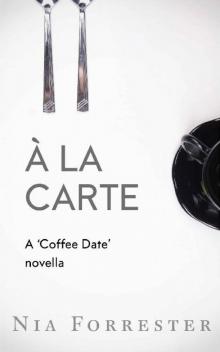- Home
- Nia Forrester
Courtship: A 'Snowflake' Novel
Courtship: A 'Snowflake' Novel Read online
courtship
a ‘snowflake’ novel
Nia Forrester
Copyright © 2019 Stiletto Press
All rights reserved. No part of this publication may be reproduced, distributed or transmitted in any form or by any means, without prior written permission.
Stiletto Press
Philadelphia PA 19109
www.niaforrester.com
Publisher’s Note: This is a work of fiction. Names, characters, places, and incidents are a product of the author’s imagination. Locales and public names are sometimes used for atmospheric purposes. Any resemblance to actual people, living or dead, or to businesses, companies, events, institutions, or locales is completely coincidental.
Book Layout © 2016 BookDesignTemplates.com
courtship/ Nia Forrester -- 1st ed.
For those struggling to begin again.
Ibrahim Carter needs to chart a new course for his life. Having returned home after almost a decade in prison, he is no longer father to a young son nor husband to a deferential wife. Now, his son is a father himself, and his wife, Jada, is a woman changed by her newfound independence.
Struggling to figure out his future, his marriage, and most especially his very identity, Ibrahim finds that to move forward, he must look back …
Over the course of one weekend, he and Jada revisit the first heady days of their young and often immature romance, remembering the courtship that ripened into love, and trying to decide whether the bond they once shared can be revived or is gone for good.
1
Now
Ibrahim opens his eyes around four a.m. as is his habit. He sits up, and next to him, Jada mumbles in her sleep, turning onto her side, facing away from him.
Lowering his feet to the floor, he slips out of the room and into the hallway. He showers, pulls on some clothes and leaves the house. It is still dark outside, and his mind is drawn to his son, about an hour away. Kaleem will already be up and training with his coach. He has a new one, because it is mere months from the Olympic Trials. The previous homegrown approach to workouts has given way to more professional, expensive training. The pressure is on, especially since Kaleem is now a father—and Ibrahim a grandfather—to a six-month-old baby boy. His name is Anwar.
It means, ‘light’, Kaleem explained, his voice filled with pride. Anwar Ibrahim Carter.
And Ibrahim smiled.
Anwar looks like both his parents. His complexion, currently that of a roasted peanut will ripen to a richer, darker hue, and his eyes are the same light-hazel as his mother’s, with the same short, dense, spiky eyelashes like a mink’s coat. Anwar has Asha’s disposition, smiling easily, and content to lie quietly in his crib or play alone, occasionally gurgling to himself, or bursting out into loud, high-pitched shrieks as if testing to make sure he still has a voice in this world. His nose, his lips, his ears are Kaleem’s, and he reminds Ibrahim of what his son looked like as an infant.
Like I spat him out, Kaleem likes to say. And Asha rolls her eyes, but smiles indulgently.
About two months after Anwar was born, Ibrahim spent a weekend with them. In the morning, when Kaleem woke up to run, Asha got up as well, and breastfed their son, sitting on the sofa next to him while Kaleem put his runners on and prepared to leave the house.
Once, walking in on the moment, Ibrahim apologized and retreated to the second bedroom their voices trailing behind him. Kaleem and Asha talk all the time, their apartment always filled with the sounds of their voices, narrating to each other innocuous details about their day and the hours they were apart.
Bruh peeled out of the parking lot at like, ninety, I’m tellin’ you …
… is the meanest teacher in the whole school, and I kind of hope they fire her before I get back … I guess that makes me mean.
I was so high off that run, baby, I almost jumped over the car instead of getting into it …
… Wonder if I’ll always have this little pooch now. I should start running with you again.
Kaleem makes Asha laugh, and when Ibrahim looks at her with his son, he sees a light in Kaleem’s eyes that no one else—except now, Anwar—can ignite.
Ibrahim found himself wishing that he and his wife talked as much. They used to, but not now. Now, there is often silence in their house.
When he first came home, they talked. Well into the night, and for weeks afterwards, they had long, meandering conversations and bouts of spontaneous lovemaking. But that, too, has slowed and almost stopped.
The very first time he touched Jada, after he came home from prison, Ibrahim was hesitant, slow, and embarrassed that his hands trembled. He was afraid of the strength of his need, and that he might hurt her.
Jada was patient, and kept saying that it was okay, that he could go slow, that it was okay … okay … okay.
Her saying that had an effect that was opposite of what she probably intended. He was not reassured. It made him worry that prison had not only stripped them of their easy intimacy, but of her belief that he could please her as a man.
They managed it that night, though the first time had been too quick, and no doubt unsatisfactory for her. He waited until he was ready again, and the second time had been better, but still, not good enough. He wanted to try yet again, but Jada said it was okay … okay … okay. And so he just held her until she fell asleep.
He did not sleep as easily. Or, really, at all, until early the next morning after he was finally able to make her pant and perspire and moan his name the way she used to before his own reckless actions and the State of California had splintered his family, and separated him from his wife.
Making his way down the block to Free Range, the newest café in the neighborhood, Ibrahim notes that the streets are quiet, deserted, and clean. All the gangbangers are gone and in their place are signs on almost every block about city council meetings, and neighborhood parties, farmers’ markets and garage sales. Free Range is open twenty-four hours because the couple who owns it, lives on the upper level and have a rotating cast of characters who staff it around the clock. The couple is young, and friendly, and blonde and perpetually suntanned. The guy wears flip flops all the time no matter his attire, and occasionally he dons skirts, which bear Polynesian prints.
It’s called an ie lavalava, he told Ibrahim when he caught him looking.
And then he launched into a soliloquy about how he didn’t really buy into the whole “gender binary thing” especially when it came to something as meaningless as the garments one put on their body.
That’s cool, Ibrahim told him, though all he was doing was just hoping dude would stop talking.
His name is Martin, and his partner’s name is Thea. That’s what he calls her, his “partner.” Funny, the changes in meaning that word has gone through in Ibrahim’s lifetime. But while he was in prison, it came to mean ‘life partner’ or ‘domestic partner’. Apparently straight people use it now as well.
Though the streets are quiet, and it would be an ideal morning for it, Ibrahim no longer runs as often. He lost the habit when he was in prison for practical reasons, and afterwards, found that he did not enjoy it as much as he used to. When he started, many years ago, it was because it gave him an outlet for the urge he had to move, to get things moving, to get ahead. Now, he has a different impulse—to sit still, to contemplate, to enjoy and appreciate. He is not as hungry as he once was, and that worries him.
Sometimes, he still runs with Kaleem; though not lately now that he has had to train harder. Kaleem can run circles around him, and that makes him proud.
“Mr. Carter!”
He approaches Free Range and finds the front door open, and Thea on her knees wiping the glass with cheesecl
oth, holding a bottle of organic cleaner.
She stands upright and smiles at him, wiping her hands on the thighs of her jeans and setting aside the cleaning tools to take one of his hands in both of hers. She does a little bow when she greets him, a habit she says she picked up in India, where she once lived on an ashram.
Although he is aware that she’s a cliché, Ibrahim likes her. She has that kind of blonde hair that always looks frizzy and dry, and out of control. She doesn’t do much with it, except pull it back with a scarf once in a while. Stray strands are always wafting out of nowhere into her greenish eyes, and she swats them away impatiently.
She reminds him of someone. He can’t remember who.
“Lemme guess,” she says now. “Spinach omelet with egg whites only.”
“You got it.” Ibrahim nods. “I’ll help out while you’re doing that and put these up.” He indicates the folded umbrellas for the outdoor seating, still folded, and stacked in a corner.
“Yeah, thanks. That’d be cool. It’s going to be a real scorcher today, apparently.”
While Thea goes in to make his breakfast, he unfolds the umbrellas one by one and chooses a place to sit. When seated, he takes the time to look around and sees that the neighborhood is still quiet, the soft light beginning to sharpen around the edges.
He has left his phone at home. Having a cell phone with him all the time is something he still hasn't become accustomed to.
You can’t do that, Ibrahim! Jada said to him once, when she returned from work and found his smartphone abandoned on the entryway table.
He discovered her sitting on the sofa, the device clutched tightly in both her hands. She was still wearing her scrubs from work, eyes rimmed in red.
I didn’t know what to think! she continued, her eyes still a little wild.
You should think I forgot my phone, he told her, calmly.
And then she dropped the phone to the carpeted floor at her feet, put her face in her hands and began to cry with an energy that seemed disproportionate to the circumstances.
It was like that at first, after he came out. Like she wasn’t sure she knew him anymore, and didn’t know what to expect. It stung that she thought there was any scenario, any circumstance that would have him walking out on her without a word. But the gulf between them is undeniable. They are new people now, and have not yet completely re-learned each other.
When Jada works a long shift, as she did last night, his wakefulness unsettles her, making it difficult for her to fall and stay asleep. That is why Ibrahim leaves the house. She sleeps better, he thinks, when he is not there. And yet, paradoxically, his absence also makes her uneasy.
“Here we go!”
Soon, Thea returns, bearing a tray, but on it are three plates. One with Ibrahim’s omelet, another with scrambled egg whites and avocado, and another with whole grain toast. There is also a decorative teapot, and two teacups.
“Do you mind if I join you?” Thea asks.
“Of course not. Please.” Ibrahim gives a brief nod.
Thea sits in the chair opposite him. She has pulled her hair back more securely and is now wearing sunglasses atop her head. She pours them tea.
Ibrahim smiles at her and then shuts his eyes to say a brief, silent blessing over their meal. When he opens them, Thea is staring at him.
“Were you praying?” she asks.
“Yes.”
“To whom?” Thea’s head falls to one side.
Ibrahim’s eyebrows involuntarily lift.
“I mean … what religion are you?” she amends.
“I believe in the existence of the Divine, the Most Holy.”
Thea smiles. “That’s not really an answer though, is it?”
Ibrahim shrugs. “I don’t have a religion,” he tells her.
“And I don’t believe in God,” Thea says conversationally.
“No?”
“No.” Thea picks up her fork. “The world is just a random, violent place. And we have to take from it whatever joy we can find.”
Staring at her for a moment, Ibrahim feels a sudden sadness.
“You’re too young to have such a grim outlook,” he says.
“You don’t think it’s random and violent?” Thea asks. “The world?”
“Sometimes violent. But never random.”
“If you really believe that, Mr. Carter, then you must have been a lucky, lucky man.”
“Ibrahim,” he says. “Please. Call me Ibrahim.”
Thea takes a bite of her eggs and shuts her eyes for a moment to savor the taste.
“Where’s your … partner?” Ibrahim asks, stumbling over the new terminology.
“Martin?” Thea says. “He’s with Michelle tonight. I mean, that’s where he was last night. Probably be back soon.”
“Michelle,” Ibrahim repeats.
Thea shrugs. “We’re poly. Michelle is his girlfriend.”
To mask his surprise, Ibrahim lifts the teapot and pours himself a cup.
“You’ve probably seen her,” Thea continues. “Brownish-blonde hair cut short. Kinda masculine-of-center?”
Masculine-of-center. Another term to become acquainted with. He will look it up later to be sure, but it sounds self-explanatory. There were less polite terms when he was coming up, which Ibrahim later trained himself not to use, because they are too finite and too definite. They deny people the complexity of their identity and their humanity.
Ibrahim thinks he has seen Michelle. She dresses in overalls, long and short, and an assortment of boots. She doesn’t shave her legs, but one side of her hair is completely buzzed down to the scalp.
“She works here sometimes,” Thea continues. “Will probably work today, when she comes back with Martin. If you’re interested in meeting her.”
The way she’s babbling about this Michelle sounds hyper-casual, like she is trying to speak into existence, an acceptance of Martin’s other girlfriend.
Young ‘uns today, Ibrahim thinks. The things they lie to themselves about.
He happens to believe human beings are territorial in nature, like wolves, like lions. And the effort to intellectualize themselves into sharing that which they may want to be theirs alone seems more strenuous than he could imagine.
When he was incarcerated, there were endless painful nights, wondering where Jada might be, and whether somehow, someway, another man had reasoned, seduced, or tricked his way into her heart and into her bed. It was easier not to have too much contact with his wife while he was locked up, because then he wouldn’t have to fear hearing the gradual fading of affection in her voice. He had seen it happen to other men inside and watched their despair and powerlessness as romantic and family bonds dissolved right before their eyes.
Ibrahim hadn’t allowed himself to hope that Jada had remained his while he was away. He simply told himself that it had to be so. And if not, when he got out, he would make it so—woo her back from a new lover and reclaim her if he had to.
But Jada had remained constant. And, if his instincts were correct once they finally made love that first time after his return home, she had remained celibate as well. He couldn’t imagine having to share her.
“How’s the tea?” Thea seems to have sensed his momentary withdrawal.
“Excellent,” he says, taking another sip in confirmation.
“Good. There’s an interesting story behind it …”
There are always interesting stories these days.
A fine cotton shirt woven by nuns in Southern Italy.
A dark-roast coffee so smooth, so unique that it saved an entire impoverished Cota-Rican village.
Or a guide-dog trained by happy and fulfilled maximum security prisoners.
This is, as far as Ibrahim can tell, an entirely new social phenomenon. People must now justify their comforts. To have anything, you must prove that you have taken nothing from the Universe, only given something back of equal or greater value.
It is a philosophy he appreciates, but the way it i
s displayed and discussed with such self-satisfaction, is tedious.
By the time Thea has finished her “interesting story”, Ibrahim has finished his omelet. He reaches for his wallet.
“No, no,” Thea says with a shake of the head. “I appreciated the company.”
The shadow of Martin passes between them, as does her not-quite-convincing nonchalance about him being with someone else.
“I baked bread.” She stands and reaches for their tray. “I’ll bring you a loaf. Still warm. You can bring it home to … your wife?”
Ibrahim nods. “Yes. She’ll be waking up soon.”
Thea nods and picks up the tray. Ibrahim stands to help her, but she shakes her head again.
“I’ve got it,” she says, sounding almost testy. “Let me get you that bread.”
As she walks away, Ibrahim has the distinct feeling that he’s let her down.
He takes a twenty out of his wallet. Whether she likes it or not, he’s going to pay for his meal. And since twenty dollars would be an overpayment for a spinach omelet and a cup of tea, even in a hipster joint like this, he intends to consider it payment for the bread as well.
When Thea returns with the bread in a bag, her eyes immediately fall to the twenty in Ibrahim’s hand. Her shoulders drop almost imperceptibly, as does her smile. With the money in hand, he has altered their time together from neighborly to transactional.
“Here.” She hands him the bread and takes the money without looking at it again. “Fresh out of the oven.”
For the first few seconds as he walks away, he senses her watching him leave, but when he looks over his shoulder she is already inside. She was hoping for something, he knows now.
Maybe she didn’t even know what. Maybe just a brief connection with someone other than the man she lives with, who tells her through his nights with another woman, that she is not quite enough.
~~~
The block is coming alive by the time Ibrahim is halfway home. Dog-walkers, early shift-workers and the like are out and about, along with a few runners. When he gets back to the house, he’ll call Kaleem, hear how his workout went this morning, have some idle conversation for a while.

 Courtship: A 'Snowflake' Novel
Courtship: A 'Snowflake' Novel Four: Stories of Marriage
Four: Stories of Marriage Just Lunch
Just Lunch Table for Two
Table for Two Young, Rich & Black
Young, Rich & Black À la Carte
À la Carte Resistance: A Love Story (The Shorts Book 9)
Resistance: A Love Story (The Shorts Book 9) Resistance
Resistance Rhyme & Reason
Rhyme & Reason Not That Kind of Girl
Not That Kind of Girl The Come Up
The Come Up Afterwards
Afterwards Paid Companion
Paid Companion The Seduction of Dylan Acosta
The Seduction of Dylan Acosta Maybe Never
Maybe Never The Makeover_A Modern Love Story
The Makeover_A Modern Love Story The Takedown
The Takedown